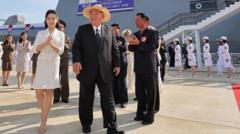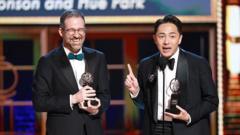On June 11, 2025, South Korea announced the suspension of its K-pop and news broadcasts directed at North Korea, marking a pivotal policy shift under newly elected President Lee Jae-myung. The action is aimed at fostering better relations between the two Koreas after years of escalating tensions.
South Korea Halts K-Pop Propaganda Broadcasts to North Korea

South Korea Halts K-Pop Propaganda Broadcasts to North Korea
The new administration takes a significant step towards improving inter-Korean relations by ceasing the loudspeaker broadcasts.
In a move to restore trust between the South and North, President Lee ordered the military to turn off the high-powered loudspeakers positioned near the border. Kang Yu-jung, spokesperson for the president, communicated that this decision aims to "help restore trust in South-North Korean relations and build peace on the Korean Peninsula."
Previously, under the leadership of Lee's impeached predecessor, Yoon Suk Yeol, inter-Korean relations deteriorated significantly, with the two countries engaging in a series of provocative exchanges. Mr. Yoon endorsed initiatives to disseminate information into North Korea, allowing activists—many of whom were defectors—to release balloons carrying propaganda materials criticizing North Korea's leader, Kim Jong-un.
North Korea retaliated by sending balloons filled with refuse into the South, escalating tensions further. Last year, South Korea began broadcasting K-pop songs and news updates to North Korean soldiers and civilians, prompting the North to amplify its own broadcasts with disruptive noises that affected residents in border regions.
By ceasing its broadcasts, Lee Jae-myung's government has essentially called for a ceasefire in this unusual communication warfare. Military officials in South Korea are observing the situation closely, anticipating whether North Korea will reciprocate by halting its own broadcasts.
Previously, under the leadership of Lee's impeached predecessor, Yoon Suk Yeol, inter-Korean relations deteriorated significantly, with the two countries engaging in a series of provocative exchanges. Mr. Yoon endorsed initiatives to disseminate information into North Korea, allowing activists—many of whom were defectors—to release balloons carrying propaganda materials criticizing North Korea's leader, Kim Jong-un.
North Korea retaliated by sending balloons filled with refuse into the South, escalating tensions further. Last year, South Korea began broadcasting K-pop songs and news updates to North Korean soldiers and civilians, prompting the North to amplify its own broadcasts with disruptive noises that affected residents in border regions.
By ceasing its broadcasts, Lee Jae-myung's government has essentially called for a ceasefire in this unusual communication warfare. Military officials in South Korea are observing the situation closely, anticipating whether North Korea will reciprocate by halting its own broadcasts.






















